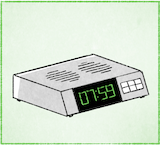
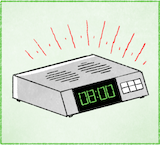
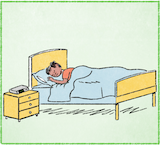
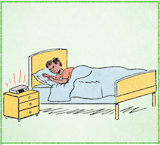
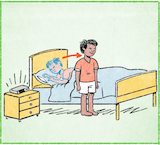
นี้คืออี่หยัง นี้คือนาลิกาปุก
นาลิกาปุกมีไว้เฮ็ดหญัง นาลิกาปุกมีไว้ถ้าปุก นาลิกาปุกซ่อยให้คนตื่นญามมื้อเซ้าได้
เขาตั้งนาลิกาปุกจักโมง เขาตั้งนาลิกาปุกเจ็ดโมงห้าสิบเก้านาที
เจ็ดโมงห้าสิบเก้านาทีเป็นญามเซ้าแม่นบ่ แม่น เจ็ดโมงห้าสิบเก้านาทีเป็นญามเซ้า
เป็นหญังเขาคือตั้งปุกญามมื้อเซ้า เพาะว่าเขาอาดสิไปเฮ็ดงาน หลือสิไปโลงเลียนกะได้ เขากะเลยปุกญามมื้อเซ้า เพื่อที่สิให้ตื่น สิให้ตื่นไปทันเวลา
นาลิกาปุกต้องตั้งเวลาบ่ ตั้งอยู่ ขั้นเฮาอยากตื่นญามใด เฮากะตั้งเวลาปุกญามนั้น
ขั้นอยากตื่นญามเที่ยง เฮากะตั้งนาลิกาปุกญามเที่ยง ขั้นอยากตื่นญามเซ้า เฮากะตั้งนาลิกาปุกญามมื้อเซ้า
2
นาลิกาปุกมันเป็นอี่หยัง นาลิกาปุกมันกำลังปุก
มันปุกตอนจักโมง มันปุกตอนสองโมงเซ้า ตอนแปดนาลิกามันดังขึ้น
เพาะว่าเขาตั้งนาลิกาปุกตอนสองโมงเซ้า พอฮอดสองโมงเซ้าแล้ว นาลิกาปุกมันกะสิดังขึ้น มันกะสิดังบักแฮงหนึ่ง เสียงดังบักคัก เฮ็ดให้เสียงดังๆ
เพาะว่าคนกำลังนอนหลับ ขั้นได้ญินเสียงนาลิกาปุกดังๆ คนกะสิตื่น กะสิตื่นขึ้นเลย
3
เขากำลังเฮ็ดหญัง เขากำลังนอนหลับ
เขานอนหลับอยู่ใส เขานอนหลับอยู่ในห้องนอน
ห้องนอนของพุใด จักคือกัน ห้องนอนนี้กะอาดสิเป็นห้องนอนของเขา เขากะเลยนอนหลับอยู่หั้น เขานอนอยู่เทิงเตียงนอน
ข้างเตียงนอนของเขามีโต่ะนอนพ้อม มีโต่ะน้อยๆ โต่ะสีเหลียง
อยู่เทิงโต่ะของเขากะมีนาลิกาปุกพ้อม ในโต่ะนั้นกะมีลิ้นชักพ้อม ลิ้นชักมีสามอัน
ตอนนี้เขากำลังนอนหลับ นอนหลับเป็นตาแซบ นอนหลับเป็นตามีแฮง
เขาเอาหัวของเขาหมุนอยู่เทิงหมอน แล้วเขากะผ้าห่มห่มโตของเขา นอนเป็นตาแซบหลาย เป็นตามีแฮงบักคักหนึ่ง
4
เขากำลังเฮ็ดหญัง เขากำลังสิตื่น
เป็นหญังเขาคือสิตื่น เขาได้ญินเสียงนาลิกาปุก
เขาตั้งนาลิกาปุกไว้ มันฮอดเวลาปุกแล้ว นาลิกาปุกมันกะเลยดังขึ้น
พอเขาได้ญิน กะเฮ็ดให้เขาตื่น เพาะว่านาลิกาปุกมันเสียงดังหลาย มันเสียงดังบักคัก กะเลยเฮ็ดให้เขาตื่น เฮ็ดให้เขาตื่นนอน
5
เขากำลังเฮ็ดหญัง เขากำลังตื่นนอน
พุซายคนนี้เขาตื่นนอนแล้ว เขาลุกขึ้นมาจากเตียงแล้ว
แล้วเขาสิญ่างไปใส เขาสิเฮ็ดอี่หยังต่อไป กะบ่ลู้คือกัน
เขาลุกขึ้นมาจากเตียงแล้ว เขาบ่ได้ใส่เกิบเลย เขากำลังสิญ่างไป
จักสิญ่างไปใส เขาอาดสิฟ้าวไปอาบน้ำ อาดสิไปเฮ็ดงานหลืออาดสิไปโลงเลียนกะได้
Link to overview page
Link to dictionary
| Isaan | Pronunciation | Tones | Thai | English/Notes |
|---|---|---|---|---|
| นี้ | ni: | HF | นี้ | 1. this 2. here |
| คือ | khʉ: | HR | คือ | 1. to be, to resemble, like, as 2. why {บักหล้าคือบ่เก็บโต่ะแน่ = [addressing a young boy] Why haven't you cleared the table?} |
| อี่หยัง | i:-yaŋ | H-M | อะไร | 1. what {นี้คืออี่หยัง = What is this?} {มื้อนี้เจ้าเฮ็ดอี่หยัง = What are you doing today?} {กินเข้างายกับอี่หยัง = What did you have for breakfast?} 2. something, anything, (in negations) nothing {บ่ต้องเฮ็ดอี่หยังอีกเลยนอกจากใส่ปุย = [we] don't need to do anything besides adding fertilizer} |
| นาลิกาปุก | na:-li-ga:-puk | HR-H-M-M | นาฬิกาปลุก | alarm clock |
| มี | mi: | HR | มี | 1. to have 2. there is |
| ไว้ | wai | HF | ไว้ | 1. to keep, to put, to place, to retain, to save, to reserve {เขาเอาหัวของเขาไว้ใส = Where does she put her head?} {หมาสิเลี้ยงไว้บ้าน = dogs are kept/raised in the house} {ไก่เลี้ยงไว้ในคอก = chicken are kept/raised in a coop} {หน้ามันบังไว้ = the face is covered/not visible} {เขาเอาโทละสับวางไว้หู = he holds the phone to his ear} 2. for {นาลิกาปุกมีไว้เฮ็ดหญัง = What is an alarm clock for?} {หม้อเอาไว้เฮ็ดแนวกิน = a pot is used to make food} {ก่องเอาไว้เฮ็ดหญัง ก่องเอาไว้ใส่ของ = What is the box for? It's for putting in stuff.} Notes: see also ไว้ถ้า |
| เฮ็ด | het | H | ทำ | to do, to make |
| หญัง | ɲaŋ | M | อะไร, เป็นหญัง = ทำไม | 1. what {เขากำลังเฮ็ดหญัง = What is he doing?} {ธูปเอาไว้เฮ็ดหญัง = What are incense sticks for?} 2. something, anything, (nothing) 3. เป็นหญัง[...]คือ in initial position: why {เป็นหญังเขาคือใส่บักพิกลงไปในกวยเตียว = Why is he putting chili in [his] noodle soup?} {เป็นหญังหน้าต่างมันคือเปิด = Why is the window open?} {เป็นหญังมันคือมีควนไฟ = Why is there smoke?} |
| ไว้ถ้า | wai-tha: | HF-LF | usually in a positive statement or answer: is for, is used for, has the purpose of {กะทะมีไว้ถ้าทอด = a pan is for frying} {น้ำบักนาวมีไว้ถ้าปุงอาหาน = lime juice is used to season food} {ปากกามีไว้ถ้าเขียน = a pen is for writing} {กะเทียมเอาไว้ถ้าเฮ็ดแนวกิน = garlic is used to make food} {ขาเอาไว้ถ้าญ่าง = legs are for walking} {เกิบเอาไว้ถ้าใส่ = shoes are for wearing} Notes: see also ไว้ |
|
| ปุก | puk | M | ปลุก | alarm clock: to ring {นาลิกามันกำลังปุก = the alarm clock is ringing} |
| ซ่อย | sɔ:i | H | ช่วย | to help, to assist {ขอบใจเด้อที่มาซ่อย = Many thanks for your help!} |
| ให้ | hai | LF | ให้ | 1. to give {หมอกำลังเอายาให้คนป่วยกิน = the doctor is giving the patient medicine} 2. for 3. to allow, to be allowed |
| คน | khon | HR | คน | person, people |
| ตื่น | tʉ:n | H | ตื่น | to wake up |
| ญาม | ɲa:m | HR | ยาม | 1. period of time {ญามมื้อเซ้า = morning} {ญามเที่ยง = noon} 2. when, while {ญามทอด ต้องใซ้น้ำมันพ้อม = one needs to use oil when frying} {ญามสิออกไปข้างนอกกะต้องใส่เกิบ = when one goes out, ones has to wear shoes} |
| มื้อเซ้า | mʉ:-sao | HF-HF | เช้า | morning |
| ได้ | dai | HF | ได้ | 1. can 2. to get, to obtain 3. before verb: indicating past tense 4. บ่ได้ + verb: not |
| เขา | khao | M | เขา | personal pronoun: he, she |
| ตั้ง | taŋ | HF | ตั้ง | to set/put up, to install, to establish, to erect {เขาตั้งนาลิกาปุกตอนสองโมงเซ้า = he sets the alarm clock to eight o'clock in the morning} {พัดลมตั้งโต่ะ = table fan} {ทะนาคานมันสิไปตั้งไว้อยู่ซู่หม้องเอาโลด = banks are [established/can be found] everywhere!} {ตั้งไฟ = to set up a fire} |
| จัก | jak | M | จัก | 1. answer to a question: [I] don't know, don't know exactly, [I'm] not sure {พุซายคนนี้เขาเถ้าไป่ จัก จักเถ้าหลือบ่เถ้า เบิ่งบ่ค่อยออก = Is this man here already old? I don't know. I can't see clearly whether he's old or not.} {เขาเว้ากันอยู่ใส จักคือกัน = Where are they talking? I don't know either.} 2. exact(ly), what exactly {จักต้มอี่หยังกะบ่ฮู้ = I don't know what (exactly) he is cooking} {บ่ลู้คือกันจักปาอี่หยัง = I don't know either what kind of fish this is} 3. how much/many? {ต้นไม้มีจักต้น = How many trees are there?} {ตอนนี้จักโมงแล้ว = What time is it now?} {มือของเฮานี้สิมีจักนิ้ว = How many fingers do our hands have?} 4. a bit, a little bit {จักหน่อย/จักหน่อยหนึ่ง = a bit, a little bit} |
| โมง | mo:ŋ | HR | โมง | o'clock, hour {ตอนนี้เวลาจักโมงแล้ว = What time is it?} {ตอนนี้เวลาห้าโมงเคิ่ง = It's half past five.} |
| เจ็ด | jet | M | เจ็ด | seven |
| ห้าสิบ | ha:-sip | LF-M | ห้าสิบ | fifty |
| เก้า | gao | HF | เก้า | nine |
| นาที | na:-thi: | HR-HR | นาที | minute |
| เป็น | pen | M | เป็น | 1. to be, to exist 2. to be able to 3. to suffer, sth. happens to 4. เป็นหญัง[...]คือ in initial position: why? {เป็นหญังเขากะคือแปงฟัน = Why is he brushing his teeth?} {เป็นหญังเคี่ยงบินมันคือสิตก = Why is the airplane falling down?} |
| เซ้า | sao | HF | เช้า | morning Notes: see also มื้อเซ้า, เข้าเซ้า |
| แม่นบ่ | mɛ:n-bɔ: | H-H | ใช่ไหม | question particle: ..., right? ..., isn't it? ..., don't you? etc. {เจ้าได้เห็นสิ่งนั้นแม่นบ่ = You've seen that, haven't you?} {ฝนกำลังตกแม่นบ่ = It's raining, isn't it?} {นี้คือกะคุแม่นบ่ = This is a bucket, isn't it?} |
| แม่น | mɛ:n | H | ใช่ | 1. yes 2. affirmative particle |
| เพาะว่า | phɔ-wa: | H-H | เพราะว่า | because |
| อาด | a:t | LF | อาจ | 1. might, may, will 2. likely |
| สิ | si | M | จะ | future tense auxiliary {เขากำลังสิตื่น = he's about to wake up} {สิไปตะหลาด = [I'm] going to the market} |
| ไป | pai | M | ไป | 1. to go 2. auxiliary indicating action extending into the future |
| เฮ็ดงาน | het-ŋa:n | H-HR | ทำงาน | to work |
| หลือ | lʉ: | M | หรือ | or |
| โลงเลียน | lo:ŋ-li:an | HR-HR | โรงเรียน | school |
| กะ | ga | M | ก็ | 1. then, consequently 2. also |
| เลย | lə:i | HR | เลย | 1. futher on, beyond, past {เข็มน้อยเลยเลขสิบสองไป = the minute hand has passed number twelve} 2. too much 3. at all 4. definitively 5. completely, utterly |
| เพื่อที่ | phʉ:a-thi: | H-H | เพื่อที่ | in order to, so that Notes: the vowel เอือ is likely to be a Thai loan |
| ทันเวลา | than-we:-la: | HR-HR-HR | ทันเวลา | in time |
| ต้อง | tɔŋ | HF | ต้อง | to have to, must |
| เวลา | we:-la: | HR-HR | เวลา | time, period |
| บ่ | bɔ: | H | ไม่ | 1. no, not 2. question particle, transforming a statement into a question Notes: spelling exception in line with common usage on social media |
| อยู่ | yu: | H | อยู่ | 1. to be (located) at 2. yet, still 3. auxiliary indicating continuous or progressive action {ทอดปาอยู่ในกะทะ = (in the process of) frying a fish in the pan} {แม่กำลังเมี้ยนเฮียนอยู่ = mother is cleaning/tidying up the house} |
| ขั้น | khan | LF | เมื่อ | when, if |
| เฮา | hao | HR | เรา | 1. personal pronoun: we 2. personal pronoun: I |
| อยาก | ya:k | LF | อยาก | to want, to wish |
| ใด | dai | M | ใด | 1. which, that one which, what, how {เขานั่งแบบใด เขานั่งขดตะหมาดอยู่ = How is he sitting? He's sitting cross-legged.} {ตอนใด = when?} 2. whichever, whoever {หม้องใดหม้องหนึ่ง = some place, somewhere} {ขั้นเฮาอยากตื่นญามใด เฮากะตั้งเวลาปุกญามนั้น = If we want to get up at a certain time, we set the alarm to that time} Notes: sentence-final often with a marked rising tone |
| นั้น | nan | HF | นั้น | that, there |
| เที่ยง | thi:aŋ | H | เที่ยง | noon |
| มัน | man | HR | มัน | it (also used to refer to people) |
| กำลัง | gam-laŋ | M-HR | กำลัง | auxiliary indicating continuous or progressive action |
| ตอน | tɔ:n | M | ตอน | when, period {ตอนสองโมงเซ้า = at 8 o'clock in the morning} {ในตอนกินเข้า = when eating} |
| สอง | sɔ:ŋ | M | สอง | two |
| แปด | pɛ:t | LF | แปด | eight |
| นาลิกา | na:-li-ga: | HR-H-M | นาฬิกา | 1. clock, watch 2. o'clock {สิบสองนาลิกา = 12 o'clock} |
| ดัง | daŋ | M | ดัง | 1. noise/music etc.: loud 2. to make a noise, to ring, to go off etc. {นาลิกาปุกมันกะสิดังขึ้น = the alarm clock will go off} |
| ขึ้น | khʉn | LF | ขึ้น | 1. to go up, to increase 2. sun: to rise {ตะเว็นกำลังขึ้น = the sun is rising} 3. more 4. bus/train etc.: to get on, to board {พุโดยสานขึ้นลดไฟเบิดแล้ว = all passengers have boarded the train} |
| พอ | phɔ: | HR | พอ | 1. just when, just after, as soon as 2. enough, adequate |
| ฮอด | hɔ:t | HF | ถึง | 1. to arrive, to attain {ฮอดจุดหมายปายทาง = (airplane, train etc.) to arrive at one's destination} {มันทันได้ฮอดหกโมงอยู่ = it's not yet 6 o'clock} 2. to, at {ผมญาวฮอดบ่าไหล่เอาโลด = long hair down to the shoulders} 3. about {บ่ได้เว้าฮอด = [I] haven't talked about [this]} {คนที่เฮาเว้าฮอดวั่งหั้นหละ = the person we've just talked about} |
| แล้ว | lɛ:o | HF | แล้ว | 1. finished 2. already 3. and then, and next (especially แล้วกะ) 4. auxiliary for past tense |
| บัก | bak | M | 1. intensifier before adjectives {ปาโตบักใหญ่ = a (very) large fish} 2. prefix in front of fruits and vegetables {บักแตงโม = watermelon} 3. can be used as a reference for a male person of the same or younger age {บักอันนี้ = this lad} |
|
| แฮง | hɛ:ŋ | HR | แรง | 1. strong {ลมกำลังพัดแฮงอยู่ = to wind is blowing strongly} 2. loud {เสียงแฮง = loud} 3. strength, power |
| หนึ่ง | nʉŋ | H | หนึ่ง | 1. one 2. after adjective: intensifier {บักคักหนึ่ง = very much} {อันบักใหญ่หนึ่ง = very large}, or attenuates the meaning {กะดาดมันแผ่นน้อยๆ หนึ่ง = the piece of paper is [relatively] small} |
| เสียงดัง | si:aŋ-daŋ | M-M | เสียงดัง | loud |
| บักคัก | bak-khak | M-H | intensifier: very, very much (variant of คัก) | |
| นอนหลับ | nɔ:n-lap | HR-M | นอนหลับ | to sleep |
| ได้ญิน | dai-ɲin | HF-HR | ได้ยิน | to hear |
| เสียง | si:aŋ | M | เสียง | 1. sound, noise 2. tone, voice |
| ใส | sai | M | (ที่)ไหน | 1. where? {สิไปใส = Where are [you] going?} {มาแต่ใส = Where are [you] coming from?} {กะทะอยู่ใส = Where's the pan?} 2. somewhere, anywhere {ใสกะได้ = anywhere, wherever you like} |
| ใน | nai | HR | ใน | in, within |
| ห้องนอน | hɔŋ-nɔ:n | LF-HR | ห้องนอน | bedroom |
| ของ | khɔ:ŋ | M | ของ | of, belonging to |
| พุใด | phu-dai | H-M | ใคร | 1. who {มีพุใดโทมากะบ่ลู้ = I don't know who has called} {ห้องนอนของพุใด = whose bedroom (is this)? } 2. someone, somebody, anybody, in negative context: nobody {บ่มีพุใดอยู่กับเขาเลย = there's nobody with him} |
| คือกัน | khʉ:-gan | HR-M | เหมือนกัน | 1. also, likewise, similarly {ยินดีที่ได้ฮู้จักคือกันคับ = Nice to meet you too!} 2. in negative sentences: either {บ่ลู้คือกัน = I don't know either} {จักคือกัน = I don't know (either)} |
| หั้น | han | LF | ที่นั่น | there, over there |
| นอน | nɔ:n | HR | นอน | 1. to lie down 2. to sleep |
| เทิง | thə:ŋ | HR | บน | 1. on, on top of, at, in {เทิงโต่ะ = at/on the table} {กบมันนั่งอยู่เทิงใบบัว = the frog is sitting on the lotus leaf} {เทิงท้องฟ้า = in the sky} {มันแล่นอยู่เทิงลาง = [the train] runs on rails} {มีคนนั่งอยู่เทิงลดสามล้อสามคน = there are three people sitting in the tuk tuk} 2. up, upward Notes: pronunciation: also realized as ทัง |
| เตียง | ti:aŋ | M | เตียง | bed |
| ข้าง | kha:ŋ | LF | ข้าง | 1. side {มีหูจับสองข้าง = there are handles on both sides} 2. next to {วางอยู่ข้างๆ ก่องใบใหญ่ = it's placed next to the large box} {เขายืนอยู่ข้างๆ อีกพุหนึ่ง = he's standing next to another person} 3. clf. for body parts which come in pairs (eyes, ears, legs etc.) {เขามีตาสองข้าง = she has two eyes} |
| โต่ะ | to | H | โต๊ะ, เก้าอี้ | 1. table 2. chair |
| พ้อม | phɔ:m | HF | พร้อม | at the same time, also, too {มีตะเว็นพ้อม = the sun's out, too} {กะทะมีด้ามพ้อม = the pan has also a handle} |
| น้อย | nɔ:i | HF | น้อย | 1. few, little 2. small |
| สี | si: | M | สี | 1. color 2. colored pencil, crayon |
| เหลียง | li:aŋ | M | เหลือง | yellow |
| ลิ้นชัก | lin-chak | HF-H | ลิ้นชัก | drawer |
| สาม | sa:m | M | สาม | three |
| อัน | an | M | อัน | 1. thing, object 2. general clf. for objects |
| ตอนนี้ | tɔ:n-ni: | M-HF | ตอนนี้ | now |
| ตาแซบ | ta:-sɛ:p | M-HF | น่ากิน | 1. tasty looking, to be appetizing 2. to be sleeping well {นอนเป็นตาแซบหลาย = [he's] sleeping well} |
| ตามีแฮง | ta:-mi:-hɛ:ŋ | M-HR-HR | น่าสบาย | happily, comfortably, feeling well |
| เอา | ao | M | เอา | to take, to give {เขากำลังเอาก่องไปซั่ง = he's taking the boxes to weigh them} {หมอกำลังเอายาให้คนป่วยกิน = the doctor is giving medicine to the patient} {เอาไว้ถ้า = is for, is used for, has the purpose of} |
| หัว | hu:a | M | หัว | 1. head 2. clf. for onions, bulbs of garlic |
| หมุน | mun | M | to support, to prop up {เขาเอาหัวของเขาหมุนหมอนอยู่ = she's supporting her head with a pillow} | |
| หมอน | mɔ:n | M | หมอน | pillow |
| ผ้าห่ม | pha:-hom | LF-H | ผ้าห่ม | blanket |
| ห่ม | hom | H | ห่ม | to cover, to wrap |
| โต | to: | M | ตัว | 1. body, self 2. clf. for animals, characters/letters/consonants, appliances, clothes (e.g., pairs of trousers, shirts) |
| หลาย | la:i | M | เยอะ, มาก | many, much, very |
| บักคักหนึ่ง | bak-khak-nʉŋ | M-H-H | intensifier: very, very much (variant of คัก) | |
| พุซาย | phu-sa:i | H-HR | ผู้ชาย | man, male |
| ลุก | luk | H | ลุก | 1. to be in flames, to burn 2. to rise, to get up, to stand up |
| มา | ma: | HR | มา | 1. to come 2. auxiliary expressing action towards the present or focal time {กะคุเฮ็ดมาจากอี่หยัง = What is the bucket made of?} {แล้วเขากะเก็บเงินจากพุนั้นมา = and then she takes the money of that person} |
| จาก | ja:k | LF | จาก | 1. from {... เฮ็ดมาจากอี่หยัง = ... is made from what?} 2. to depart |
| ญ่าง | ɲa:ŋ | H | เดิน | to walk {เขากำลังญ่างเว้ากัน = they are walking and talking} {ลูกเป็ดญ่างไปนำแม่เป็ด = the ducklings are [walking] following their mother} {เขากำลังญ่างข้ามสะพาน = she's walking over the bridge} {เขาสิญ่างไปใส = Where is he going?} |
| ต่อไป | tɔ:-pai | H-M | ต่อไป | next |
| ลู้ | lu: | HF | รู้ | 1. to know 2. to understand Notes: equivalent to ฮู้ |
| ใส่ | sai | H | ใส่ | 1. to put something in/on {เขาใส่บักพิกในกวยเตียวหลาย = he's putting a lot of chili in his noodle soup} {เขาบีบยาสีฟันใส่แปงสีฟัน = he squeezes toothpaste on the toothbrush} {ก่องเอาไว้ใส่ของ = boxes are there to put stuff in} 2. to wear (clothes) {เขาใส่เสี้ยแขนญาว = he's wearing a long-sleeve} 3. directed at {เอิ้นใส่กัน = to call each other/to say to each other} {หมามันเห่าใส่แมว = the dog barks at the cat} {ล้องเพงใส่ไม = to sing into the microphone} {เขากำลังซี้มือไปใส่พุซาย = she's pointing at the man} |
| เกิบ | gə:p | LF | รองเท้า | 1. shoe 2. general term for footwear |
| ฟ้าว | fa:o | HF | รีบ | to hurry, to rush |
| อาบน้ำ | a:p-na:m | LF-HF | อาบน้ำ | to take a bath/shower |